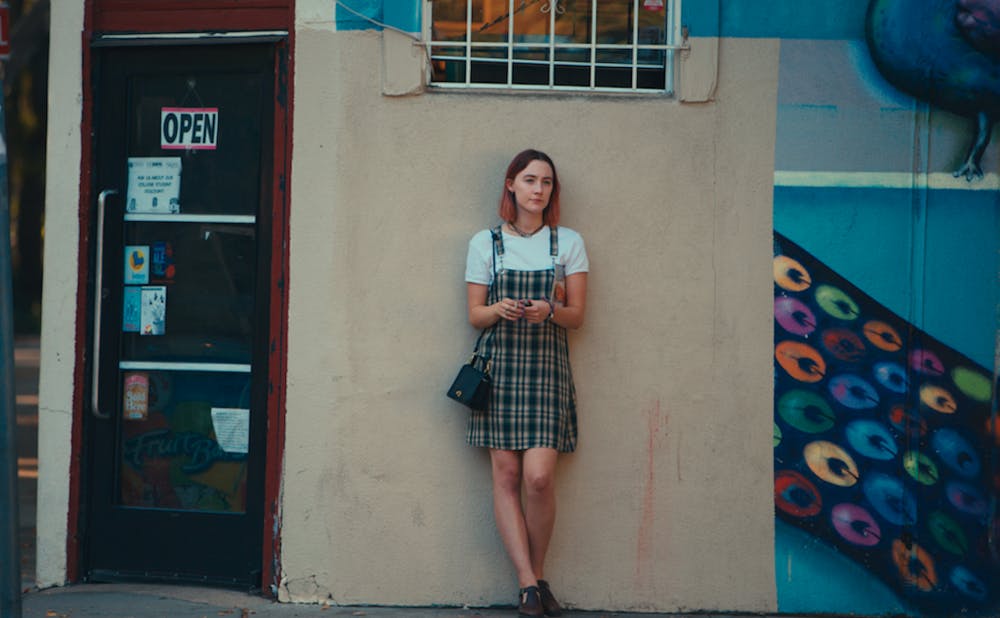In Greta Gerwig’s directorial debut, “Lady Bird,” Saoirse Ronan plays Christine McPherson, a self-possessed teen who’s stuck in Sacramento for her final year at an absurdly wealthy and suffocatingly Catholic high school. She yearns to chase the art and culture of the real world, which she’s certain is somewhere on the East Coast — anywhere but here — and aches for something that’s infinitely larger than she knows. She goes by a self-given name: Lady Bird.
The film is first and foremost about coming of age and, as such, hits all the required notes: Lady Bird cuts class to eat stolen communion wafers with her best friend (Beanie Feldstein), she pranks a sister at her school by writing “married to Jesus” on her car, she loses her virginity to a dirtbag (Timothée Chalamet) and goes to prom with the same dirtbag, whom she ditches before the night begins. These insulated moments of youth — small in consequence, but earth-shattering in Lady Bird’s private world — fulfill the checklist of requirements for the film to become an endearing “teen angst movie.” They saturate the film with the nostalgia for youthful innocence and soft rebellion that makes the bildungsroman easy to love.
To derive the film’s success solely from the nostalgic value of its genre, however, would trivialize Lady Bird’s adolescence as a phase, a trope, and be completely untrue — the genre is merely a framework. What gives color, vibrancy, texture and life to the film are the continuous moments in between the big ones that are unexpected, but once there, so obviously necessary. After Lady Bird walks in on her first boyfriend (Lucas Hedges) kissing another boy, he later reappears in her life to plead her not to tell anyone. As he collapses into sobs, Lady Bird, despite her stubborn intellect and brokenhearted resentment, holds, in the kindest way — with protection despite total uncertainty — the first person in the film to really hurt her. This is the last time the audience sees him, and perhaps it’s the last time for Lady Bird, too, but for the moment they’re safe. This is one of the quiet micro-realities of Lady Bird’s life, the storm of small worlds that make and try her. Indeed, the film had the audience at Telluride Film Festival (where it premiered) laughing uncontrollably in one scene then, thirty seconds later, crying with all their hearts.
“Lady Bird,” in its filmic craft, is not self-indulgent. It’s not obsessed with imbuing within each frame cinephilic meaning that requires the audience to sleuth out contrived narratives. Instead, the cuts are quick and shots unpretentious. There is no cinematographic riddle. The film shows to us exactly what it is, bringing us closer to the performances, the characters and their raw feeling. Here, what you see is what you get, and it’s exquisite. After Lady Bird’s mother (Laurie Metcalf), with whom she shares a difficult relationship that is both portrayed impeccably and drives the film, tells her, “I just want you to be the best version of yourself.” Lady Bird asks, “What if this is the best version?” and is met with silence. Although Lady Bird is fully aware of the limits of her reality, she fights for the entire film against her mother and her situation in a desperate and blind attempt to find something better. For Gerwig, who was inspired by her own experience growing up in Sacramento and moving to New York out of a vocational desire to create art, this resonates: Gerwig reflects in an L.A. Times interview, “I certainly had that feeling of, where is the real thing happening? And then you realize, no, the real thing happened to you.”
Despite inevitable teenage myopia, Lady Bird is not denied her agency. Gerwig allows her to be painfully vulnerable without exploiting her trauma — the film never asks us to psychoanalyze Lady Bird, but to empathize with her as she’s tasked with the impossible: growing up. She is both grounded and irrational, rude and sympathetic, surprising and disappointing. For her, the present is oppressive and the future paralyzing, and meanwhile the audience watches alongside not to protect or counsel, but to bear witness. This is real life. “Lady Bird” is present, genuine and irresistible. It speaks deeply because we’ve all been there — we are there.
Get The Chronicle straight to your inbox
Signup for our weekly newsletter. Cancel at any time.

